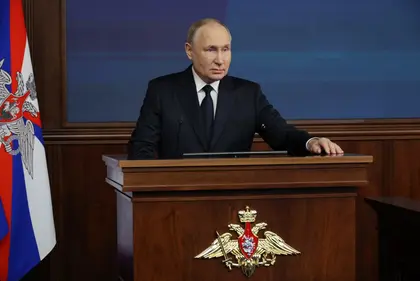President Putin is ready to negotiate a ceasefire in Ukraine and has been sending signals through intermediaries since September, according to The New York Times.
In stark contrast to recent public statements dismissing the idea and saying Russian troops are doing “what we want,” Putin is reported to have been using back-channel diplomacy to concede that the Kremlin would be happy freezing the front line where it is.
JOIN US ON TELEGRAM
Follow our coverage of the war on the @Kyivpost_official.
One international official that met with top Russian counterparts this fall, said: “They say: ‘We’re ready to have negotiations on a cease-fire.’
“They want to stay where they are on the battlefield.”
A former Russian official told the paper Putin “really is willing to stop at the current positions,” but added: “He’s not willing to retreat one meter.”
Quoting American officials, the NYT also claims that Putin sent out a similar message in September 2022 when a Ukrainian counteroffensive retook great swathes of land occupied by Russia in the northeast of the country.
But other officials urged caution, believing the talk of a ceasefire could be part of a misinformation campaign to mislead the world and does not reflect a genuine willingness to compromise.
When asked if the talk of a ceasefire was accurate, Kremlin spokesperson Dmitri Peskov, said: “Putin is indeed ready for talks and he has said so.

HUR Evacuates 34 People From Syria to Ukraine
“Russia continues to be ready, but exclusively for the achievement of its own goals.”
Publicly, both Moscow and Kyiv have dismissed the option of resolving the war through negotiations, AFP reports.
In Kyiv, any talk of a Russian willingness to stop the fighting gets short thrift. On Tuesday, President Zelensky said: “We see just a brazen willingness to kill.
“I see only arrogance and murder in their rhetoric.”
Putin routinely claims that Moscow is open to negotiations but he said during his televised briefing that peace would only be achieved when Ukraine was “de-militarised” and “de-Nazified.”
Many in Moscow expected Russia to quickly capture Kyiv in 2022, but nearly two years later – and with Russian elections approaching – a bullish Putin used the stage last week to promise “victory will be ours,”
“There will be peace when we achieve our goals,” he said, avoiding any timeframe.
Neither side has made significant gains this year and analysts say Russia and Ukraine lack resources to mount any serious offensive – for now.
But Putin praised Russian troops for “improving” their positions along most of the front and observers say Moscow's troops were making gains towards Avdiivka, a war-battered industrial hub in the east.
Ukraine now wants to entrench as effectively as Russian forces have along the front, but have also gained a foothold on the east bank of the Dnipro river into Russian-held territory.
Putin dismissed these gains, telling reporters Ukrainian forces were being ordered into “extermination” from Russian forces.
Analysts say that with neither side able to mount large-scale offensives, Moscow and Kyiv will work on reconstituting their militaries.
Zelensky said he wants Ukraine to produce one million drones – a key weapon for the war – and also develop domestic production of arms and ammunition.
But he also said he had rejected – for now – a request from the army to add as many as 500,000 civilians to the military.
Putin, who is aiming to curry favour with Russians ahead of the March vote, ruled out during his press conference any fresh mobilisation of Russians next year.
He said that Moscow had voluntarily recruited 486,000 men for the army in 2023 and that efforts to build up the military next year would accelerate.
And he promised to bolster Russia's defence capabilities, with the economy turned towards the war effort and the Kremlin shrugging off the impact of sweeping Western sanctions.
You can also highlight the text and press Ctrl + Enter






